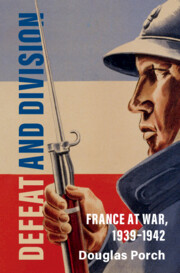Refine search
Actions for selected content:
15401 results in Military history
Chapter G - John Tewhey
-
- Book:
- Military Memories
- Published by:
- Anthem Press
- Published online:
- 13 January 2023
- Print publication:
- 13 September 2022, pp 107-114
-
- Chapter
- Export citation
Chapter D - Arne Salvesen
-
- Book:
- Military Memories
- Published by:
- Anthem Press
- Published online:
- 13 January 2023
- Print publication:
- 13 September 2022, pp 73-86
-
- Chapter
- Export citation
Chapter A - Eugene R. Fidell
-
- Book:
- Military Memories
- Published by:
- Anthem Press
- Published online:
- 13 January 2023
- Print publication:
- 13 September 2022, pp 29-36
-
- Chapter
- Export citation
Chapter B - Our Shared Experiences
-
- Book:
- Military Memories
- Published by:
- Anthem Press
- Published online:
- 13 January 2023
- Print publication:
- 13 September 2022, pp 156-159
-
- Chapter
- Export citation

Defeat and Division
- France at War, 1939–1942
-
- Published online:
- 25 August 2022
- Print publication:
- 25 August 2022
5 - “The War Is Over for Us”
-
- Book:
- Defeat and Division
- Published online:
- 25 August 2022
- Print publication:
- 25 August 2022, pp 230-278
-
- Chapter
- Export citation
7 - La France libre
-
- Book:
- Defeat and Division
- Published online:
- 25 August 2022
- Print publication:
- 25 August 2022, pp 338-384
-
- Chapter
- Export citation
Introduction
-
- Book:
- Defeat and Division
- Published online:
- 25 August 2022
- Print publication:
- 25 August 2022, pp 1-4
-
- Chapter
- Export citation
Maps
-
- Book:
- Defeat and Division
- Published online:
- 25 August 2022
- Print publication:
- 25 August 2022, pp x-x
-
- Chapter
- Export citation
Copyright page
-
- Book:
- Defeat and Division
- Published online:
- 25 August 2022
- Print publication:
- 25 August 2022, pp iv-iv
-
- Chapter
- Export citation
6 - “The Wisdom of a Great Leader”
-
- Book:
- Defeat and Division
- Published online:
- 25 August 2022
- Print publication:
- 25 August 2022, pp 279-337
-
- Chapter
- Export citation
Bibliography
-
- Book:
- Defeat and Division
- Published online:
- 25 August 2022
- Print publication:
- 25 August 2022, pp 672-701
-
- Chapter
- Export citation
Figures
-
- Book:
- Defeat and Division
- Published online:
- 25 August 2022
- Print publication:
- 25 August 2022, pp vi-ix
-
- Chapter
- Export citation
9 - France’s North African Hinterland
-
- Book:
- Defeat and Division
- Published online:
- 25 August 2022
- Print publication:
- 25 August 2022, pp 436-490
-
- Chapter
- Export citation
Abbreviations
-
- Book:
- Defeat and Division
- Published online:
- 25 August 2022
- Print publication:
- 25 August 2022, pp xi-xviii
-
- Chapter
- Export citation
2 - From Phoney Peace to Phoney War, 1938–1940
-
- Book:
- Defeat and Division
- Published online:
- 25 August 2022
- Print publication:
- 25 August 2022, pp 60-123
-
- Chapter
- Export citation
3 - Case Yellow
-
- Book:
- Defeat and Division
- Published online:
- 25 August 2022
- Print publication:
- 25 August 2022, pp 124-179
-
- Chapter
- Export citation
Epilogue
-
- Book:
- Defeat and Division
- Published online:
- 25 August 2022
- Print publication:
- 25 August 2022, pp 556-563
-
- Chapter
- Export citation
Contents
-
- Book:
- Defeat and Division
- Published online:
- 25 August 2022
- Print publication:
- 25 August 2022, pp v-v
-
- Chapter
- Export citation
8 - “Grandi soldati”
-
- Book:
- Defeat and Division
- Published online:
- 25 August 2022
- Print publication:
- 25 August 2022, pp 385-435
-
- Chapter
- Export citation
